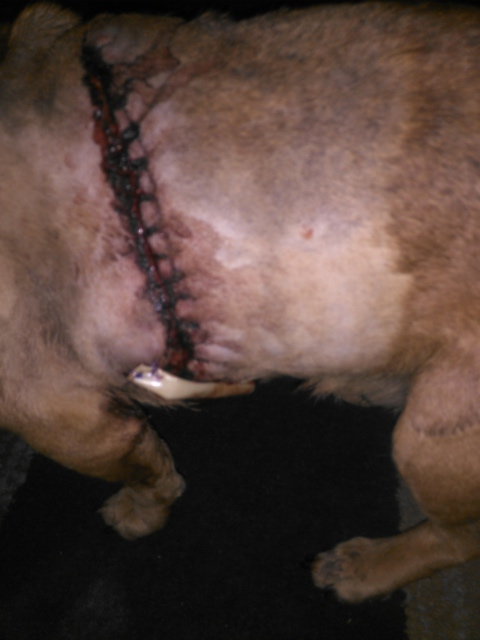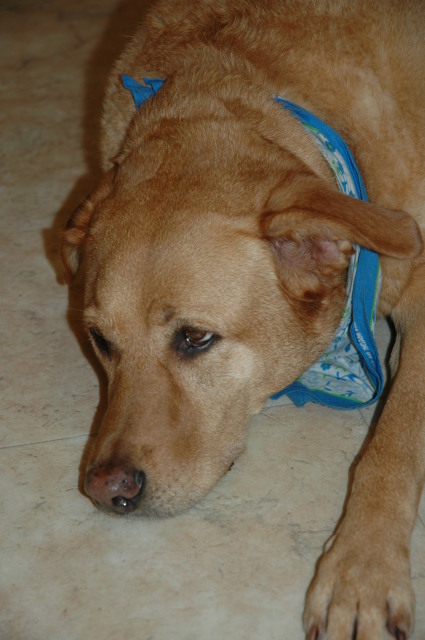QuestionHello. I have a concern regarding our 11 month old great dane. We got him about three weeks ago, and when he came to us he was very smelly and itching contantly. So we bathed him. As we were doing so, we noticed he had a rash covering almost his whole body. I took him to the vet and they prescribed antibiotics; we also switched his food, started giving him benadryl, and had him professionally groomed. Well after all that he still has the rash, is smelly again, and he itches like crazy. Is there anything other that you recommend we try before taking him back to the vet? Any tips you have would be greatly appriciated. Thank you!
Hollie
AnswerHi Hollie,
I'm very sorry to hear of your dog's skin condition. I know how uncomfortable your dog is, and how frustrating it is to treat a dog with a chronic skin condition.
First, since you got this dog recently, have you contacted the breeder or whomever you purchased the dog from? Many breeders and even pet stores have health guarantees.
Did your vet do an intradermal allergy test, or skin reaction test? Have mange mites been ruled out? Without knowing the specific cause of the itch, you are only treating the symptoms, and not the root cause. While medications might have temporary results, the itchy symptoms will always return because the condition hasn't been cured.
You didn't say what kind of food you've switched to. Simply changing a dog's food when a food allergy is suspected won't do in many cases. The problem with determining if food allergies are present is that dogs
are usually allergic to only one ingredient, or to a small number of ingredients, not to the whole diet. So the problem becomes isolating the food that is causing the problem.
Your dog needs to be on an "elimination diet", which is a carefully controlled method of detecting the allergen (if indeed the problem is with his diet).
In an "elimination diet" the dog is fed a food with ingredients that it has never received before. It consists of a novel protein and carbohydrate source, such as duck, venison, and potatoes. While on the elimination diet no treats, chewable medications, table scraps, or rawhide toys should be given to the dog, since they may contain an allergen.
This diet trial must be fed for at least 10 weeks. If the dog's itching subsides by at least half, the allergen is considered to be one or more food ingredients. To confirm this, you can reintroduce the old food to see if the symptoms return. To find the specific ingredients that trigger the allergy, you should feed the special diet again and add one ingredient at a time from the old diet for at least a week until the itching increases, indicating that the last added ingredient is an allergen. Or you may choose to stay with the special food to avoid causing your dog's discomfort each time an allergic ingredient is fed.
Veterinarians offer these special diets, and some may be found in retail stores. Or you may choose to feed your dog a homemade diet of foods recommended by your vet.
There is no cure for allergies. They are a lifelong problem, and oftentimes they get worse as a dog gets older.
Most of the time, when a dog has a food allergy, the dog chews at it's itchy feet, it's not something that over takes the entire body. It doesn't sound like this is a food allergy to me (but then, I'm not a doctor).
Atopic, or inhalant, allergies are also fairly common in dogs. Breathing in or directly contacting airborne particles in the environment, such as mold spores, dust, tobacco smoke, and pollens, will activate atopic allergies. Although dogs with atopic allergies sometimes have respiratory problems such as coughing and sneezing, they more typically develop itchy skin.
There are many conditions that can make a pet itch or have hair loss, including seborrhea, endocrine, autoimmune, infectious, and parasitic skin diseases. It takes some detective work to identify the cause, and very often trying more than one method of treatment, before finding one that works for your particular dog. Your veterinarian may be able to diagnose the problem or you can ask for a referral to a veterinary dermatologist.
If it isn't possible to see a veterinary dermatologist, skin biopsies can be very helpful in sorting through these kinds of problems, at least at giving some direction for further testing. It is best to have the skin biopsy specimens examined by a pathologist with an interest in skin diseases, if possible. Veterinary schools and larger referral centers are good choices for this sort of case, since they often have the capability of doing both the exam and lab work, which can be helpful.
Besides the main over-all itch, if your dog has been scratching and chewing at himself enough, there might be secondary bacterial or yeast infections which also need to be treated. Both yeast and bacteria thrive on warm moist skin, and add to your dog's discomfort. The smell you mentioned could be a sign of a yeast infection.
Considering how your dog is suffering with this itch, I'm surprised your vet didn't prescribe something more than Benadryl. Dogs can also be given Clemastine (Tavist tm), which is another over the counter antihistamine, it's a different medication than Benadryl (not just a different brand). Some dogs do better on one, rather than the other. Ask your vet for the correct dosage.
Although corticosteroids, such as Prednisone have certain risks for long term use, they really work well when used in the short term to break the itch cycle, and allow your dog's skin to begin to heal. It's best to use as low a dose, as possible. Corticosteroids can be used on a "as needed" basis, for the worst itching episodes, but once started, you must taper off how often they're given, rather than stopping their use completely and suddenly.
Along with seeking out a diagnosis, you might try using an Omega fatty acid supplement. 3V Capsules(tm) are favored by veterinary dermatologists as they contain a higher percentage of the fatty acids thought to be helpful in treating skin and coat conditions. It takes up to 8 weeks of daily dosing before the benefits from essential fatty acid supplementation might be seen, and not all dogs are helped. Antihistamines used in combination with the 3V capsules can also be beneficial, and might help lessen the amount of a prescription anti-itch medication needed.
Regular bathing with soothing or antibacterial shampoos can be helpful, although not all dogs are cooperative about this.
In a dog this young, it would be worth considering going to a dermatologist, confirming that allergies are the problem and trying hyposensitization (allergy shots). It works about 70% of the time to control the itching and has few side effects compared to medications. This is costly the first year but over time I think it is less costly and more comfortable for the dog, when it works. Knowing that allergies are present and what the allergies are, can sometimes allow better planning for medication use, even if you don't elect to try allergy shots.
I wish I had an easier solution for your problem.
Best of luck,
Patti

 chihuahua pees on bed
Questionme and boo
QUESTION: I have a 9 month ol
chihuahua pees on bed
Questionme and boo
QUESTION: I have a 9 month ol
 tumor on my dog
Question
stitched up second tim tumor
My d
tumor on my dog
Question
stitched up second tim tumor
My d
 Senior dog not eating
Question
Meggie Girl
I will be so grateful if you can h
Senior dog not eating
Question
Meggie Girl
I will be so grateful if you can h
 aggressive behavior between my 3 dogs
Question
My loves watching tv
I have always had boxers,
aggressive behavior between my 3 dogs
Question
My loves watching tv
I have always had boxers,
 Dry Dog Foods
Question
Prince Duke & Princess
I have two B
Dry Dog Foods
Question
Prince Duke & Princess
I have two B